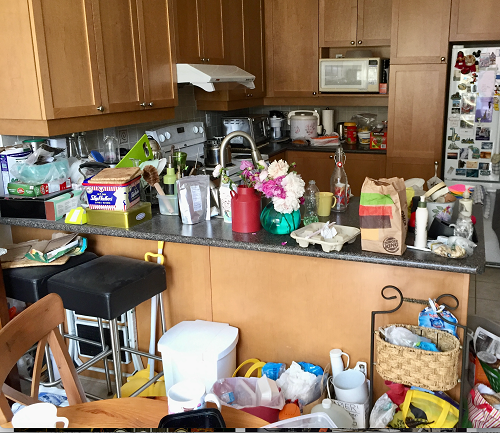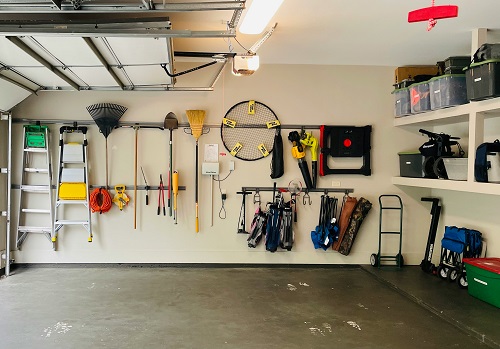Address the Elephant in the Room: Helping Your Friend Tackle Clutter
By Pamela Wong
Pamela is a Trained Professional Organizer based in Oakville, Ontario and is the owner of Zen N Organized. She helps homeowners and small business owners transform their homes and home offices into organized spaces. She has a practical, non-judgemental approach to organizing. Her objective is to create functional and harmonious spaces for her clients.

Have you ever experienced this: You are invited to a friend’s house for a get together but as soon as you walk in, you notice the house is full of clutter. You are overwhelmed by the chaos and can’t even enjoy the party. Other guests look just as uncomfortable and everyone finds the first excuse to leave.
You would love to help your friend, but unsure of how to approach such a sensitive topic. You know the importance of a clutter-free home. It is not just the esthetics of the home, but also the mental well-being and productivity of the people living in it. This blog will provide some practical tips for addressing this sensitive topic.
Preparing For The Conversation
Here are a few things to consider in preparation of the “talk”:
1. Be Understanding
Clutter is often a manifestation of deeper issues such as stress, lack of time or emotional attachments. Try to put yourself in their shoes and consider what might be causing the clutter.
2. Recognize the Signs
Assess the situation by recognizing the signs. Notice if your friend seems overwhelmed by their living space. Pay attention to comments they make about their inability to find things. Identify how clutter might be affecting their daily life and mental health. Make a mental note to emphasize how a clutter-free space could improve their overall well-being.
3. Choose the Right Time and Place
Bringing up the topic of clutter when your friend is already feeling stressed or overwhelmed can backfire. Instead, wait for a moment when you’re both relaxed, perhaps over a cup of tea or during a casual get-together. A quiet and private setting ensures your friend doesn’t feel embarrassed or defensive.
4. Be Empathetic and Non-Judgmental
Approach the topic with sensitivity and understanding. Make sure they don’t feel judged. For example: “I understand that life gets busy and sometimes managing everything can be overwhelming. I’ve had times when my own home felt like it was closing in on me because of all the stuff.”
Use “I” statements to express your concerns without sounding accusatory. Frame your observations and feelings from your own perspective. This can help your friend feel less defensive and more open to the conversation. For example: Instead of saying, “Your house is really cluttered,” you could say, “I’ve noticed that when my space gets cluttered, it affects my mood and productivity. Have you felt that way too?”
Starting The Conversation
1. Open with Positive Reinforcement
Begin by acknowledging positive aspects of their home or their life. Compliment their taste or any recent efforts they’ve made to tidy up.
2. Acknowledge Their Feelings
Validate their emotions and let them know it’s okay to feel the way they do. Recognize that clutter might be tied to a busy lifestyle or emotional memories. For example: “I know you’ve been juggling a lot lately, and it’s totally understandable if organizing your home hasn’t been a priority. It’s a lot to manage, and you’re doing your best.”
3. Share Personal Experiences:
Relate a similar situation you’ve been through to create a sense of camaraderie. Mention how decluttering helped you and the benefits you experienced.
Offering Practical Help
1. Suggest Small, Manageable Tasks
Propose ideas and steps that would help your friend. It may be starting with one room or even one drawer to avoid feeling overwhelmed. Break the process into small, achievable steps.
2. Offer to Help
Volunteer your time to assist with the decluttering process. Make it a fun activity by planning a decluttering day together.
3. Offer Reassurance
Emphasize that decluttering is a process and it’s okay to take it one step at a time. Reassure them that everyone faces similar challenges and that they are not alone.
4. Be Patient and Supportive
Understand that this process might take time and that your friend may not be ready to tackle everything at once. Show patience and offer continuous support rather than a one-time solution.
5. Providing Resources and Tools
Recommend decluttering ideas, suggest online resources that can guide the process. In some cases, a professional organizer may be the right call. In Canada, search for a professional organizer in your friend’s geographical area on Professional Organizers in Canada’s website: https://organizersincanada.com/get-organized/find-an-organizer/
A professional organizer with the proper training can assist your friend in decluttering, by making the right choices and recommend the appropriate storage solutions based on their needs.
6. Maintaining the Momentum
Just like cleaning your home, decluttering should be a routine. Offer to check in periodically to see how they are progressing. Encourage them to set small goals and celebrate their achievements.
Conclusion
A friend in need is a friend indeed. Being empathetic to your friend’s situation, providing support and practical steps to help declutter their home can make a significant difference in their well-being and strengthen your friendship at the same time.



